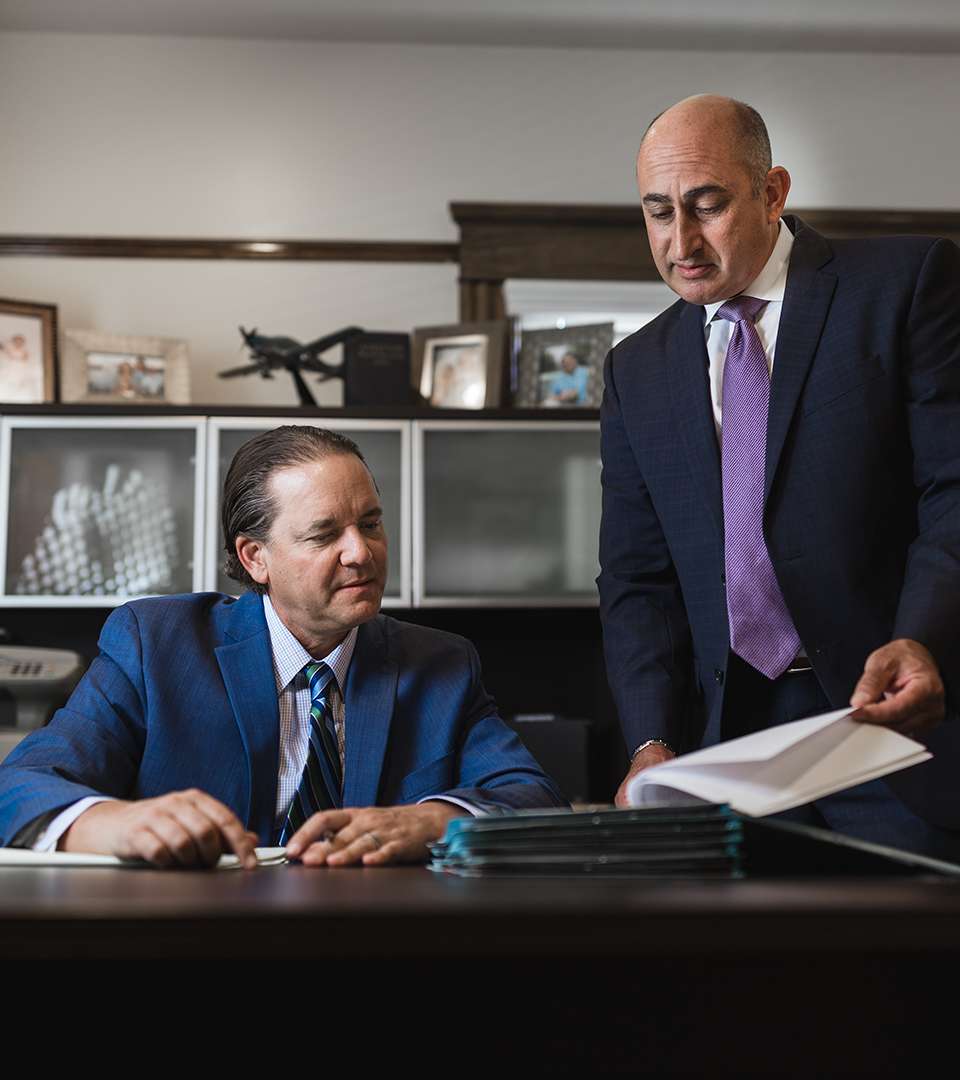
Dog Bites
Dog Bite Attorneys in Fresno
Holding Dog Owners Accountable for Dog Bite Injuries in California
It’s something that we never expect to happen, but individuals around the world and in the Fresno area are often bitten and injured by another’s dog. Because dogs are not accountable for their own actions, we hold their owners responsible. It is up to dog owners to train and control their dogs in public settings in order to keep them from injuring others.
If you or a loved one have been injured by a dog, fault can almost always be placed on the dog's owner or the individual responsible for the dog at that given time. The Fresno dog bite injury attorneys at Fowler | Helsel | Vogt know what it takes to be sure that you are compensated for every physical and financial imposition you’ve experienced from the bite.
Call Fowler | Helsel | Vogt today at (559) 900-1280 or contact us online to schedule a consultation with our dog bite lawyer in Fresno.
Common Causes of Dog Bites
Dog bites can occur due to a variety of reasons, often stemming from the dog's behavior, environment, or human interaction. Here are some common causes:
- Fear or Anxiety: Dogs may bite when they feel threatened or fearful. This could be in response to a perceived danger, unfamiliar surroundings, or loud noises.
- Pain or Illness: A dog in pain or discomfort may react aggressively if touched or approached. Illness can also affect a dog's behavior and tolerance levels.
- Protection of Territory or Owner: Dogs are naturally protective of their territory and their owners. They may perceive strangers or other animals as threats and react defensively.
- Maternal Instincts: Mother dogs may bite if they feel their puppies are in danger or if they perceive someone as a threat to their offspring.
- Provocation: Dogs can bite in response to teasing, rough play, or other forms of provocation. Pulling ears or tails, disturbing while eating or sleeping, or sudden movements can trigger a defensive response.
- Lack of Socialization: Dogs that haven't been properly socialized may feel anxious or threatened in new situations or around unfamiliar people or animals. This can lead to fear-based aggression.
- Resource Guarding: Some dogs may exhibit aggression when they feel their resources, such as food, toys, or sleeping areas, are threatened or being taken away.
- Misinterpretation of Body Language: Humans and dogs communicate differently, and misinterpretation of a dog's body language can lead to bites. Ignoring warning signs such as growling, showing teeth, or stiffening can result in aggression.
- Frustration or Redirected Aggression: Dogs may become frustrated when they are unable to access or achieve something they desire. This frustration can lead to aggression directed towards nearby people or animals, even if they are not the cause of the frustration.
- Predatory Behavior: Dogs, especially those with a strong prey drive, may chase and bite smaller animals or even children running and playing.
The Centers for Disease Control and Prevention (CDC) estimates that approximately 4.5 million people are bitten by dogs each year in the United States. According to the Insurance Information Institute (III), dog bites and other dog-related injuries accounted for over one-third of all homeowners' insurance liability claims paid out in 2020.
Children are at a higher risk of dog bites compared to adults, with those aged 5 to 9 years being the most commonly affected age group. While the majority of dog bites are minor and do not require medical attention beyond basic first aid, some bites can be severe or even fatal, especially if the victim is a young child or an elderly person.
Common Injuries in Dog Bite Accidents
Common injuries include:
Puncture Wounds: Dog teeth can create deep puncture wounds, which may not bleed much but could result in infections if not properly cleaned and treated.
Lacerations and Tearing Injuries: A dog's teeth can cause significant lacerations, sometimes resulting in torn skin, muscle, or even nerve damage. These injuries may require stitches or reconstructive surgery.
Infections: Bacteria in a dog's mouth can lead to serious infections such as:
- Cellulitis: A skin infection that can spread very rapidly.
- Rabies: Though rare, rabies is a life-threatening viral infection.
- Tetanus: A bacterial infection that affects the nervous system.
Fractures and Broken Bones: Larger dogs can exert enough force to break bones, especially in the hands, arms, or legs. Small children are especially at risk for skull or facial fractures.
Nerve Damage: Deep bites can damage nerves, leading to numbness, loss of sensation, or even long-term mobility issues.
Scarring and Disfigurement: Serious bites, especially to the face, can result in permanent scarring or disfigurement, sometimes requiring plastic surgery.
Emotional and Psychological Trauma: Many dog bite victims, especially children, experience long-term emotional distress, including post-traumatic stress disorder (PTSD), anxiety, and a lasting fear of dogs
Understanding California Dog Bite Law
In California, dog bite laws are primarily governed by Section 3342 of the California Civil Code, commonly known as the "dog bite statute."
California follows a strict liability rule when it comes to dog bites. This means that dog owners are held responsible for damages caused by their dog biting someone, regardless of whether the owner was negligent or the dog had previously shown aggression.
Under the statute, the owner of a dog is "strictly liable" for damages suffered by someone who is bitten by the dog while in a public place or lawfully in a private place, including the property of the owner.
In addition to strict liability for dog bites, a person who is injured by a dog in California can also pursue a negligence claim against the dog owner if they can show that the owner failed to use reasonable care in controlling the dog, which led to the injury.
It’s important to understand the exceptions. The law is written so that if an individual is bitten in public space or in private space for which he or she was given permission to, either by implication or by invitation, then the dog owner will be held liable for injuries and infections.
When is a Dog Owner Not Liable?
The owner may not be held liable in the following scenarios:
- A military or police dog defends itself from a provoking or harassing individual
- A military or police dog attacks in the apprehension of a suspected criminal
- A military or police dog bites in the investigation of a crime or possible crime
- A military or police dog bites in the execution of a search or arrest warrant
- A military or police dog bites in the defense of a peace officer or of another person
- The individual bitten has not been given permission to be on the private property
There is a statute of limitations for filing a lawsuit for a dog bite injury in California. Typically, this is within two years from the date of the injury.
Contact Fowler | Helsel | Vogt today to get started with our Fresno dog bite attorneys.
What to Do After a Dog Bite
Experiencing a dog bite can be a distressing and potentially dangerous situation. Here are the steps to take immediately after a dog bite:
- Get to Safety: If the dog is still aggressive or poses a threat, move to a safe location away from the dog to prevent further harm.
- Assess the Injury: Evaluate the severity of the bite. If it's a minor bite with no significant bleeding or tissue damage, you can initially treat it yourself. However, if the bite is severe, deep, or bleeding heavily, seek medical attention immediately.
- Clean the Wound: Wash the wound with soap and warm water thoroughly to reduce the risk of infection. Use mild pressure to help cleanse any debris or bacteria from the bite.
- Apply First Aid: If the wound is bleeding, apply a clean cloth or bandage to help stop the bleeding. Use an antiseptic solution or antibiotic ointment to prevent infection. Cover the wound with a sterile bandage or gauze.
- Seek Medical Attention: Regardless of the severity of the bite, it's advisable to seek medical attention, especially if the wound is deep, punctured, or located on the face, hands, or feet where infection risk is higher. Medical professionals can assess the injury, provide proper treatment, and administer vaccinations or antibiotics if necessary.
- Report the Incident: Report the dog bite to the appropriate authorities, such as animal control or law enforcement, especially if the dog is unfamiliar or its vaccination status is unknown. This helps ensure public safety and may be necessary for legal purposes.
- Document the Incident: Take photos of the wound and the dog involved in the bite, if possible. Collect information from any witnesses to the incident. Keep records of medical treatment received and any expenses incurred due to the injury.
- Contact Legal Assistance: Consider consulting with a personal injury attorney, especially if the dog bite results in significant injuries or medical expenses. An attorney can provide guidance on your legal rights, assist in filing a claim for compensation, and represent your interests if the case goes to court.
- Follow Up: Follow any instructions provided by medical professionals for wound care and infection prevention. Attend follow-up appointments as needed to monitor the healing process and ensure no complications arise.
- Take Precautions: After a dog bite incident, take precautions to avoid similar situations in the future. Be cautious around unfamiliar dogs, especially those exhibiting aggressive behavior, and educate yourself and others about dog safety and bite prevention.
Community & Legal Support Resources in Fresno
Fresno offers a variety of community and legal support resources for individuals affected by dog bites. The local animal control services are pivotal in handling reports of aggressive animals. They play a crucial role not only in managing dangerous dogs but also in educating the community about responsible pet ownership and the legal implications associated with it.
Additionally, local healthcare services in Fresno are equipped to handle animal-induced injuries, including dog bites, with several urgent care and hospital facilities providing immediate care to minimize the risk of infection. Furthermore, educational workshops and community seminars offer residents insights into preventative measures and the importance of understanding animal behavior and legal rights following an incident.
Why Choose Fowler | Helsel | Vogt?
Choosing Fowler | Helsel | Vogt for your dog bite legal needs means selecting a firm committed to your recovery and obtaining just compensation. With our no-fee guarantee, you can trust that your claim will be handled with dedication and thoroughness, without any upfront costs or out-of-pocket expenses, unless we secure compensation on your behalf.
Our extensive local knowledge of Fresno’s legal landscape and our history of achieving favorable outcomes ensures that your claim is managed with the highest level of strategic insight and support. We stand by our clients throughout the entire legal process, ensuring transparency, communication, and tailored legal strategies that protect your rights and secure a recovery that reflects the true extent of your ordeal.
What Damages Are Recoverable in a Fresno Dog Bite Case?
The damages that you can recover by filing a personal injury lawsuit from your dog bite case are intended to compensate you for the injuries and other economic and non-economic losses you suffered. The cost of medical bills can be extensive, especially if the injury turns into an infection. Additionally, time missed at work after the incident can result in a loss of wages.
Dog bite cases in California can lead to two different types of damages. Compensatory damages are those that compensate the impacted person for the following:
- Monetary losses
- Pain
- Suffering
Compensatory damages are separated into two different types:
- Special damages or economic damages - Recovery for the amount that has been expended by the victim as a result of the accident
- General damages or non-economic damages - Any losses that are not directly related to money, such as mental anguish and suffering
Punitive damages, on the other hand, are designed to act as a punishment to the defendant in addition to recourse for the victim of the dog bite. Punitive damages are only valid in cases where the dog owner directly ordered the animal to attack or if the owner did not take action when they knew the dog had an aggressive nature.

What You May Expect From a Dog Bite Settlement in California
If your injury was sustained in a manner that holds you completely innocent of a crime, and the event occurred through no provocation or harassment of any kind, it is not even necessary to prove negligence in the owner – it is more or less implied. Whether the dog was not on a leash, has a history of violence, or was improperly contained does not matter.
You may expect to recover compensation for:
- Pain and suffering
- Emergency transport and medical expenses
- Loss of wages, present and future
- Punitive damages for reckless endangerment
If you’ve been injured unsuspectingly by a dog in Fresno, we recommend you act as quickly as possible to retain legal counsel. Call our offices today at (559) 900-1280 to get started with our Fresno dog bite lawyer.
Contact Us
We've Helped Recover Millions on Behalf of Victims Just Like You. Don't Wait, Get Help Today!
Schedule your free consultation or call us at (559) 900-1280.




